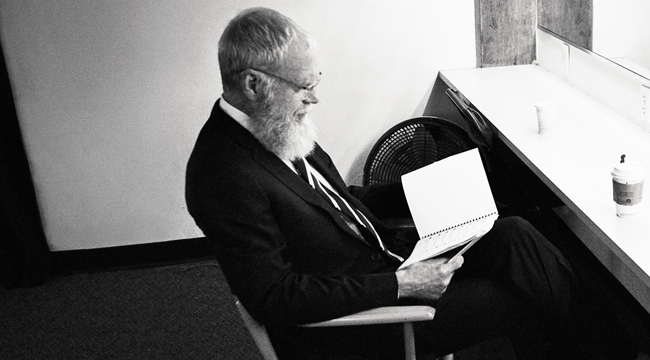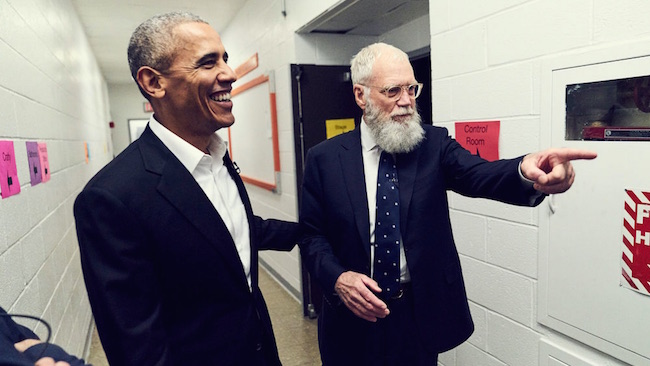
On Johnny Carson’s last Tonight Show, his final words were, “I hope when I find something I want to do, and that I think you will like, and come back that you will be as gracious as inviting me into your home as you have been. I bid you a very heartfelt goodnight.” Carson was 66 years old, four years younger than David Letterman is right now. Of course, Carson never did come back. He just faded away into the background until one day we all found out that he died. In theory, this looks like a Hollywood ending – riding off into the sunset as the King of Late Night. But reality is always different. There’s a lot of evidence that Carson wasn’t always that happy in his retirement. And no one has studied Carson like David Letterman has studied Carson. And a little more than two and a half years after Letterman “retired,” he’s officially back.
At this point, I am not at all surprised Letterman is back with a new Netflix series, My Next Guest Needs No Introduction with David Letterman. The signs were always there, which I’ve been pretty obsessed with since his “retirement” back in 2015. Conventional wisdom thought Dave would pull a Carson and just kind of disappear. That Dave never really liked being famous in the first place and will love his new life of seclusion. The truth is, Letterman didn’t like certain parts of being famous, that’s certainly true, but there were other parts of being someone with influence that he obviously loved. The problem was he used to have to do both. Now he doesn’t.
Watching My Next Guest Needs No Introduction with David Letterman (Netflix sent us two episodes but I’m only allowed to discuss one), I couldn’t help but think of a rock star who does his or her first acoustic tour. It reminded me a little bit of Bruce Springsteen’s current run on Broadway: in a “this is the essence of what I want to do, here I am, take it or leave it” kind of way with no band in the background to rely on. And here, Letterman is without Paul Shaffer (Shaffer did write the theme music) or any of that other numerous weirdos he could rely on for a quick laugh. This is Dave, unplugged. And, by golly, Dave seems to be having the time of his life.
Dave’s first guest is the 44th President of the United States, Barack Obama. But the first thing we see when the show opens is Letterman, at his office, calling Obama, pleading with him to be on his new show. After some disappointing-sounding small talk, Letterman gets off the phone, looks at the camera, and deadpans, “I think that’s a ‘no.’” (Obviously Obama changed his mind somewhere along the way.) When Letterman comes out to greet the crowd at City College in New York City, the audience has no clue who the guest will be. Letterman invites guesses from the audience. The consensus seems to be Bill Clinton, before Letterman accidentally calls on someone who is on his own new show’s staff – causing Letterman to quip, “Oh boy, when the staff starts asking questions…” (And it shouldn’t be a surprise that Letterman is still on top of his game with the quips; he’s been hosting Q&As around New York City ever since he left his CBS show, so he’s put in a lot of practice.)
A few months ago I saw Letterman interview Al Franken here in New York, a bit before Franken’s current controversies. At that show, Franken often turned the questions around on Letterman, leading to a kind of a back and forth where each person takes a turn at getting interviewed. Letterman obviously does not want that for this show. At one point, Obama tries that on Letterman. Letterman answers, but then jokingly tells the former president, “Here’s how this works, I’m going to ask a question…”

Since these are taped in advance, there’s not a lot of talk about “at this very moment” current events. There are good and bad things about this kind of format. The bad is, yes, it would be great to get Letterman and Obama’s opinions about [hold on, I’m checking Twitter to see what’s in the news this very second] Trump’s thoughts on domestic spying [update: Trump referring to other countries as a “shithole”]. But I get the sense Letterman wants these to be a little more timeless and a little broader. And I’m sure Letterman would never use the word “important,” but maybe more something we can look back at someday and get a sense for what his interview subjects were like, a slice of time that can be studied like we look back at with some of the most important people of this time like we do now with old clips of Dick Cavett, or even Bob Costas’ Later.
The biggest surprise happens when Letterman and Obama start talking about John Lewis. We fade out, and we now watch as Letterman interviews Lewis as the two walk across the Edmund Pettus Bridge in Selma, Alabama. It’s hard not to think back to Letterman doing those kinds of on-the-scene interviews with a whole array of wacky people and wacky situations – Letterman had a unique ability to bring out the most interesting things about these people right on the spot, no matter how absurd things became. Now here he is, all these years later, walking across one of the most important landmarks of the Civil Rights era with John Lewis. And there’s a poignant moment of self-reflection from Letterman. Obama does get in one more question of our host, the balance between talent and luck, and Letterman tells a story of what he was doing during the events the Selma to Montgomery March. With a lot of obvious regret, Letterman says he was getting “shitfaced” in the Bahamas because it was legal for him to drink there. And he asks himself why the hell wasn’t he in Selma. If Carson ever went back through his own career and asked himself, “What did it all mean?” he did it in private. We are watching Dave do it in front of the former President.
David Letterman is playing with house money. He really has nothing to lose. But it might be easy to think he’s got nothing really to gain, either, but that’s not true. Letterman could have never imagined what would happen to our country after he left Late Show. At the time he thought he outgrew the mantle of “trusted TV personality” and maybe we agreed with him. And then a funny thing happens, that happens so often when we realize we really do need something after it’s gone – we really missed that steady, calm voice of reason who can speak truth to power. We needed Dave back. And I think Dave needed us back, too. I have a feeling we won’t take him for granted this time.
You can contact Mike Ryan directly on Twitter.






